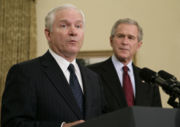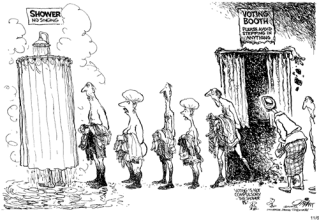Gates: If you don't want change, you don't want me.
 The will of the people has been heard and the Democrats have been chosen to lead us out of the war on terror! …or perhaps in keeping with yesterday's pessimistic post, the Democrats have simply done a better job of framing the main questions of the day and the Republican incumbents have temporarily been psychologically rejected by the angry voters! No matter how you say it, there is reason for Dems to celebrate: Rumsfeld’s resignation. But alas, the Daily Kos crowd is moaning and groaning about his replacement, former CIA director Robert Gates, calling him the “most corrupt of retreads of past Republican administrations.”
The will of the people has been heard and the Democrats have been chosen to lead us out of the war on terror! …or perhaps in keeping with yesterday's pessimistic post, the Democrats have simply done a better job of framing the main questions of the day and the Republican incumbents have temporarily been psychologically rejected by the angry voters! No matter how you say it, there is reason for Dems to celebrate: Rumsfeld’s resignation. But alas, the Daily Kos crowd is moaning and groaning about his replacement, former CIA director Robert Gates, calling him the “most corrupt of retreads of past Republican administrations.” The Daily Kos is wary of him because, according to this, “Owing to his senior status in the CIA, Gates was close to many figures who played significant roles in the Iran / contra affair and was in a position to have known of their activities.”
Hmm…“in a position to have known about their activities” is another way of saying “we don’t have any evidence of his involvement in anything.” So, before Gates is crucified because of what he may or may not have done 20 years ago, why not look at Gates in 2006? Luckily for us, this month’s issue of Texas Monthly magazine, for whom I intern, features Gates in a cover story entitled “Can this guy save the Aggies?” The article, written by Paul Burka, paints a picture of Gates that makes him seem like the best candidate Democrats could have hoped for from Bush.
Since 2004, Gates has been president of Texas A&M University, a place that is more wary of the changing nature of reality than even the Bush administration. This is because A&M, perhaps more so than any large public university in the country, is tied to its traditions. Any change in the makeup of the University—for instance, allowing women to enroll in the seventies, the name change of the Agricultural Department, and greater emphasis on recruiting minorities today—are seen by some Aggies as an attempt to diminish the Aggie tradition and spirit. Yet, when Gates came to A&M, he told the Board of Regents, “I am an agent of change…If you don’t want change, you don’t want me.”
And in fact he made a great deal of changes to A&M. Among them was a renewed emphasis on promoting diversity at the University. Although he rejected race as a factor in admissions, many minority professors have appreciated his efforts to recruit minorities by reducing ‘legacy-based’ admissions, opening recruitment centers in inner-cities, and starting scholarship programs for first generation students, such that 25% of recent classes has been comprised of such students. Gates also appointed the first ever female Dean of Texas A&M’s College of Agriculture, and began to dismantle the good old boy network that had maintained excess staff positions for years.
But does his out-of-the-box thinking as a University President translate to a similar approach in matters of defense? A few quotes from the article suggests that it does:
So, according to this article, written well before Gates’ appointment and by a moderate and possibly left-of-center writer for Texas Monthly, describes Gates as an agent of change, an ex-anti-war protestor, an unconventional thinker who owns up to his errors, and an advocate of human rights. Sounds pretty good so far. If the guy can bring change to Texas A&M, then Democrats should let him try to do the same for Bush administration. The latter might even be an easier task (full disclosure: Hook 'em horns).“Gates joined the CIA in 1966, during the Vietnam War…He opposed the war, as did most of his CIA friends, and even marched in protest of U.S. activity in Cambodia.”
“He also believed from the beginning that the Soviet Union could not sustain its vast military buildup and its foreign adventuring without risking economic collapse. In all of this, he was proved right. Gates occasionally allows himself an I-told-you-so, but he also owns up to his misjudgments.”
“Most Americans believed that Jimmy Carter was a weak president toward the Soviet Union whose emphasis on human rights was, as Gates describes the prevailing viewpoint, ‘naïve and counterproductive.’ Not Gates. By emphasizing human rights
violations, Carter ‘became the first president since Truman to directly challenge the legitimacy of the Soviet government in the eyes of its own people’”


